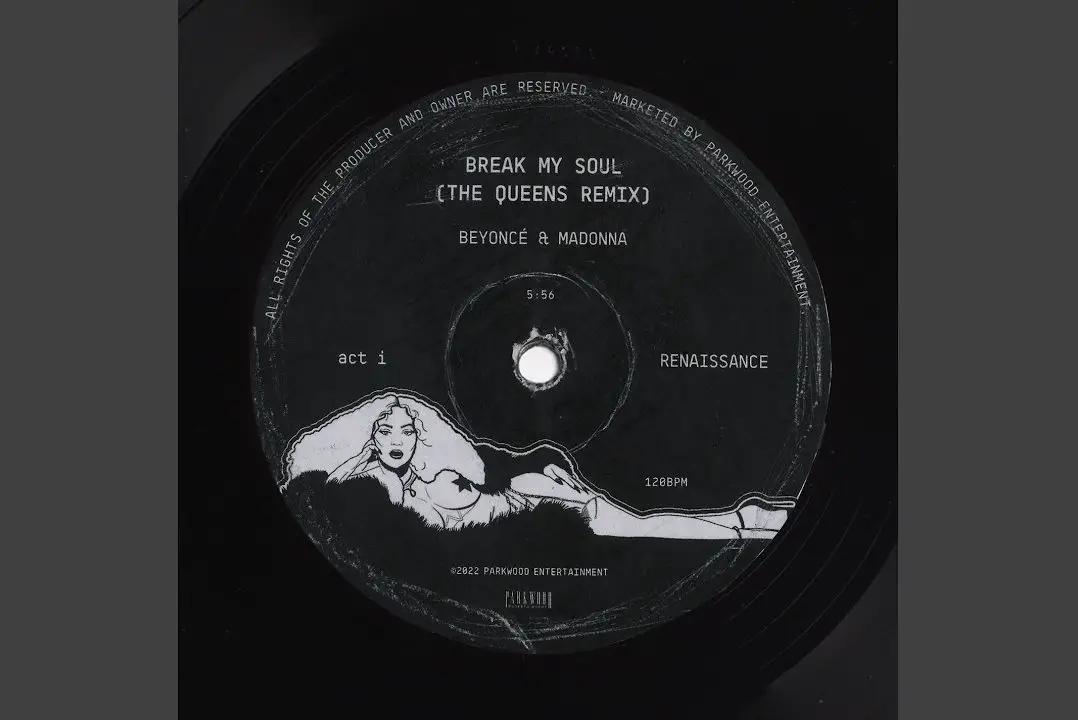On Aug. 4, Beyoncé released a remix of her newest album’s lead single, “BREAK MY SOUL,” exclusively on her website. The original track, unveiled only two months prior, already generated six remixes. The seventh, however, proved far more than a remix, but a reimagining with Madonna.
“BREAK MY SOUL (THE QUEEN’S REMIX)” not only features Madonna but corrects history in its wake. After a $1.29 purchase and a tedious email download, the first second was evocative in its surprise.
An arrangement of bass and strings already seared into the world’s memory emits from the speakers: The opening of Madonna’s “Vogue” starts the track, and immediately proves that her sample is destined for something far greater. The collaboration brilliantly fuses Beyonce’s “BREAK MY SOUL” with the musical icon’s 1990 global phenomenon.
“Vogue” has been sung in bedrooms, stages and studios around the world, yet the privilege of hearing Beyoncé sing the words “strike a pose” feels unexplainably fresh. While a cover of “Vogue” would have been more than a gift, the fusion of the two tracks marks a remarkable and challenging feat.
This remix doesn’t just include bits and pieces from “Vogue,” but boldly corrects long overdue errors.
Madonna’s original track pays tribute to voguing — an empowering and highly stylized dance that imitates striking poses and the versatile imagery found in magazines like Vogue. The dance was crafted by Black and Latinx members of the LGBTQ+ community in the ballroom scene of 1980s Harlem. Two of the most pivotal pieces of art celebrating the art of voguing came out in 1990: the famous documentary “Paris Is Burning” and “Vogue.”
While the documentary uses authentic storytelling and includes the artists behind the sensation, Madonna commodified the dance without giving them proper credit. Yes, a white cisgender woman took a queer dance from Black and Latinx artists only to make her own global music sensation. While some might argue she used her privilege to uplift diverse artists, she ultimately did so without including them.
Who Madonna credited is entirely telling. She takes from an all-white lineup of celebrities that graced the magazine covers of the mid-20th century. In the lyrics, she references Greta Garbo, Marilyn Monroe, Marlene Dietrich, Joe DiMaggio, Marlon Brando, Jimmy Dean, Grace Kelly, Jean Harlow, Gene Kelly, Fred Astaire, Ginger Rogers, Rita Hayworth, Lauren Bacall, Katharine Hepburn and Lana Turner.
None of the names she credits is at all responsible for the original dance sensation and culture she is capitalizing on. It’s as if Madonna came across the dance without realizing that its origins went far beyond magazine covers.
Beyoncé changes this in a way that is so ultimately clever, and remarkably polite. In her lyrics she references, in order, Madonna, Aaliyah, Rosetta Tharpe, Santigold, Bessie Smith, Nina Simone, Betty Davis, Solange Knowles, Badu, Lizzo, Kelly Rowland, Lauryn Hill, Roberta Flack, Toni Braxton, Janet Jackson, Tierra Whack, Missy Elliot, Diana Ross, Grace Jones, Aretha Franklin, Anita Baker, Grace Jones (again of course), Helen Folasade Adu, Jill Scott, Michelle Williams, Chloe Bailey, Halle Bailey, Aaliyah (obviously twice), Alicia Keys, Whitney Houston, Rihanna and Nicki Minaj.
Beyoncé not only uplifts 29 Black female artists, but she also credits the legendary drag and ballroom houses that Madonna never did. She namedrops the House of Revlon, House of LaBeija, House of Amazon, The House of Aviance, the House of Balmain, The House of Ninja, The House of Lanvin, House of Telfar, House of Ladosha, House of Mugler, The House of Balenciaga and the House of Mizrahi.
What’s most brilliant about these references is that Beyoncé is politely dissing Madonna. These changes allow the track to function like an unspoken diss track, while uplifting and paying respect to Madonna along the way.
While it’s brilliant she credited the famous drag and ballroom houses, truthfully it’s a shame she didn’t explicitly name-drop any LGBTQ+ artists in particular, especially since she sampled sound bites and voices from many LGBTQ+ artists on her album. Big Freedia’s voice is a major part of the original “Break My Soul,” and is still featured prominently in this remix. Respectfully, Beyoncé, where was their name honored in the lyrics?
Regardless, to choose a song like “Vogue” and fuse it with a brilliant track so fresh in the minds of the public is a risky move, especially considering that “BREAK MY SOUL” is a weaker lead single from Beyoncé. It’s enjoyable because of its clever lyrics and sampling, but the release of “Renaissance Act I” contains much stronger lead single potential with the likes of “CUFF IT” and “I’M THAT GIRL.”
The success of “BREAK MY SOUL (THE QUEEN’S REMIX)” proves that the original track was not only a weaker choice for a lead single but that its lack of depth could be brilliantly supplemented by this reimagining. It’s a shame this remix is even a remix because it is entirely lead single material. Perhaps an assist from the Material Girl herself on a lead single could undermine Beyoncé’s originality and the soft release of this remix following six prior remixes ultimately dulls the impact; however, the remix deserves major promotion and its own music video.
There shouldn’t have been any concern about the success of the remix if it was released as the lead single, as just last year Elton John remixed two of his songs, 1972’s “Rocket Man” and 1989’s “Sacrifice” with Dua Lipa for 2021’s “Cold Heart (PNAU Remix).” It proved a global sensation, and likely because of its clever familiarity. It’s more than clear that the efforts of Lipa, John, Madonna and Beyoncé are crafting a new age of remixes.
Though it was entirely worthy to lead the release of her new album, “BREAK MY SOUL (THE QUEEN’S REMIX)” changes music history while boldly correcting it along the way. In a time of tired and unfortunately abundant cash-grabbing remixes, Beyoncé once again reinvigorates the concept. Not only does the remix unashamedly outshine the original “BREAK MY SOUL,” it even surpasses “Vogue.”

















497212 144885When I came more than to this post I can only appear at part of it, is this my net browser or the internet internet site? Really should I reboot? 645530